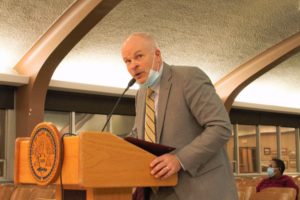By Tom Travis
The City of Flint is considering contracting with compliance consultant Ernst & Young of Detroit for compliance and implementation of the American Rescue Plan (ARP) stimulus money. According to a pending resolution by the Flint City Council, the contract would not exceed $3,994,074 for budget years FY2022 to FY2027.

City Council Finance Committee meeting in the council chambers Friday night. (Photo by Tom Travis)
Meeting as the Finance Committee, the council discussed the proposal at a Friday night meeting. Earlier this year the city was notified it would receive $94 million in ARP stimulus money from the federal government, $47 million of which has already been received in one of two installment payments.
The Finance Committee voted 6-1 to have the resolution remain in committee until the next meeting. Councilperson Dennis Pfeiffer (Ward 8) was the single no vote. Councilpersons Quincy Murphy (Ward 3) and Jerri Winfrey-Carter (Ward 6) were absent for the Friday night meeting. The resolution is not approved until it comes out of committee to the council as a whole for a final vote.
The resolution was brought to council by the city’s administration and finance department. The resolution explains that Ernst & Young would see that the ARP funds are spent in “compliance” with U.S. Treasury rules for “implementation” of the funds. If the Treasury’s rules are not complied with and implemented [spent] according to those rules the city could have to return some or all of the funds to the federal government.
According to the resolution, the contract would be a series of payments from 2022 to 2027. The installment payments would be: Year 1 – $1,150,650; Year 2 – 884,380; Year 3 – $738,025; Year 4 – $627,494; Year 5 – $523,525 totaling $3,994,074.
CFO Widigan defends the city’s need to hire a compliance firm for ARP funds
Flint’s Chief Financial Officer (CFO) Robert Widigan, who joined the City of Flint as CFO in August, answered council members’ questions about the contract for more than an hour.

Chief Financial Officer Robert Widigan in Friday night’s council finance committee meeting. (Photo by Tom Travis)
Councilperson Eva Worthing (Ward 9) asked Widigan how Ernst & Young was chosen. Widigan said the Finance Department reviewed eight consultants for the contract. Four were in Michigan and the remaining four were in Washington D.C., Tampa, FL, Falls Church, VA and Utica, NY.
The city’s finance department vetted each firm with a series of questions and a deadline of Oct. 18 to answer. According to Widigan, eight of the firms responded by the deadline and one firm responded a day late on Oct. 19, their bid was not considered in the final bid process. The eight bids considered ranged from $590,000 to $7.5 million.
The final four were chosen based on: total cost, whether or not the firm would subcontract out work, proximity to Flint and Genesee County, work with other Michigan communities, and overall experience working with government grants, Widigan stated.

The office of the city’s Finance department at City Hall. (Photo by Tom Travis)
Widigan explained the compliance firm would look into “tapping into” other pots of money. The full ARPA legislation is $1.9 trillion and Widigan added, “there are ways to tap into other funds out there that we can use to leverage these [ARPA] dollars further.”
For instance, Widigan said, there are Federal Emergency Management Agency (FEMA) dollars that the city could receive, though the specific amount and type of funds from FEMA were not discussed or defined in Friday’s meeting.
Widigan explained the actual legislation of the ARP Act is 243 pages long. “And in those pages it explains that up to 10 per cent of the ARP money can be ‘captured’ for administration costs and Ernst & Young came in at 4.2 per cent,” he said.
Widigan pointed out, “The U.S. Treasury “final rules” [for compliance and implementation of ARP funds] must be followed in spending the ARPA money and we also have to make sure we are in compliance with federal regulations.
Widigan told the council the city’s finance department told each bidder “We want a partner – we want to make sure that you’re not just gonna come in here and make sure we follow the right report and we never see you again. Help us to work with the community to make sure that the residents’ dollars are spent equitably and transparently.”
Widigan explained the finance department didn’t want a firm to subcontract work out so that they would have to work with several different firms. He said city officials want to work with “one partner.” Widigan said Ernst & Young will not subcontract any work.
“We’ve received $94 million with a bunch of hooks on it so we better get it right and make sure that it’s spent right because we don’t want to have those dollars called back.” Widigan added.

Councilperson Eva Worthing (Ward 9) voices her concerns and questions to CFO Widigan in Friday’s meeting. (Photo by Tom Travis)
Both Worthing (Ward 9) and Dennis Pfeiffer (Ward 8) asked Widigan if the “compliance and implementation” work could be done “inhouse” by the city’s finance department itself.
“I’m disappointed in this proposal,” Pfeiffer said, arguing that he thought the city’s finance department should consider conducting the “compliance and implementation” of the ARP funds “inhouse.”
Widigan’s firm and simple answer to both was, “No.” He explained the spending rules for the ARP money are “new rules, created just for the spending of the ARP funds. So we need a specialized company to maintain compliance.” The spending rules are unique and unlike traditional accounting rules that have been in place,” Widigan explained.
He noted Ernst and Young works with “hundreds of communities in 36 states…their ‘bread and butter’ is compliance.”
Pfeiffer pointed out other municipalities such as Oakland County and Royal Oak that are using compliance firms that are charging 1.5 per cent of the ARP funds that community has received. Pfeiffer asked Widigan if there was a reason Ernst & Young are charging Flint 4.2 per cent. “What are we getting for the some three per cent in this proposal?” Pfeiffer asked.

Councilperson Dennis Pfeiffer grills CFO Widigan with questions about the resolution to spend $3.9 million on a compliance and implementation consultant. (Photo by Tom Travis)
Widigan responded that he had read Oakland County’s proposal and said, “I wish Genesee County had the funds to do what Oakland County did. It seems like they have “retained members of their own team” made up of multiple firms and they’re allowing municipalities within Oakland County to piggy-back off that. Widigan further noted one of the firms Oakland County is using is Ernst & Young.
Widigan responded, “Two issues with that I see is that this is a ‘one time shot’ that we get this.” Pfeiffer interjected, “That’s exactly my point. I don’t want money coming into this community and going out the back door.”
Widigan agreed with Pfeiffer, adding that part of the responsibility of Ernst & Young will be to leverage more dollars than what the city has received and this one-time funds for one-time uses. Pfeiffer retorted, “Are you suggesting that Ernst & Young could pay for themselves?” Widigan replied that he wasn’t sure if that would happen.
However, Widigan further argued against using the city’s finance department explaining that if the city used “three of our staff” they would have to “know everything” versus using a firm like Ernst & Young who have the “right resources to make sure we get the right answer. They have people in D.C. that can get us answers.”
Pfeiffer further suggested a scenario where the city allocated the ARP funds only for water infrastructure and pandemic payments for first responders. Pfeiffer asked that if ARP funds were used only in those two categories would the city need a compliance firm?
Widigan responded, “I would still say yes. The feds are going to look at this [the spending of the ARP funds] from the start to the end. The feds are going to look at the procurement process and if the procurement process doesn’t check “the funds might not be eligible for use.”
Pfeiffer asserted, “Why do we need to spend $4 million to have someone to tell us where exactly we need to spend it when we know exactly where to spend it?”
Widigan responded again saying, “They’re not just going to tell us where to spend it. They’re going to als0 leverage for more money, more bang for our buck. So the $94 million, I would hopefully, in four years, I can stand in front of you and say that it was well above $94 million that we put out into the community for long-term stability.”
Pfeiffer suggested delaying making a decision to go into contract with Ernst & Young another four or five months and to look at the process and consider doing the compliance and implementation of the ARP funds “inhouse.” Pfeiffer explained that he’d rather delay than have the community “lose out on $4 million.”

Compliance firm Executive Director Brian Jarzynski fields questions from city council concerning the proposed contract with his firm for $3.9 million. (Photo by Tom Travis)
Pfeiffer asked Brian Jarzynski, executive director of Ernst & Young, if they were hired and at the end of the spending the ARP money the federal government came back and told Flint they had to pay back some of the money because it was not allocated correctly would Ernst & Young be liable to pay back those funds. Jarzynksi responded, “We would not take full liability.” But Jarzynski went on to explain, “Our role is to confirm compliance with the standards of the U.S. Treasury.”
Pfeiffer asserted that “the community would have no recourse.” Jarzynski responded, the recourse of the community would be limited to the amount of “our fee,” which is $3.9 million.
Councilperson Allie Herkenroder (Ward 7) asked Widigan by utilizing the compliance firm Ernst & Young that this could save the city from possible lawsuits for non-compliance. Widigan responded, “Absolutely.”
Council President Mays appoints Councilpersons Priestley and Lewis on ad hoc committee
Council President Eric Mays appointed Councilperson Judy Priestley (Ward 4), a trained accountant by profession, and Ladel Lewis (Ward 2) as a ad hoc committee to oversee and consider the spending of the city’s ARP $94 million.
Widigan, along with City Attorney Angela Wheeler and City Administrator Clyde Edwards, have all signed off on the resolution. The resolution will need to be finalized in committee then sent to a city council meeting for approval. The next regularly scheduled council meeting is 5:30 p.m. Monday, Nov. 22, held in-person on the third floor of City Hall.
EVM Managing Editor Tom Travis can be reached at tomntravis@gmail.com.


You must be logged in to post a comment.